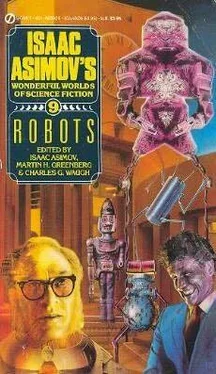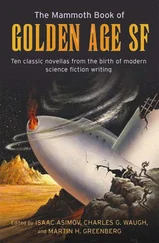Frederik Pohl - Isaac Asimov's Worlds of Science Fiction. Book 9 - Robots
Здесь есть возможность читать онлайн «Frederik Pohl - Isaac Asimov's Worlds of Science Fiction. Book 9 - Robots» весь текст электронной книги совершенно бесплатно (целиком полную версию без сокращений). В некоторых случаях можно слушать аудио, скачать через торрент в формате fb2 и присутствует краткое содержание. Год выпуска: 1989, ISBN: 1989, Издательство: Robinson Publishing, Жанр: Фантастика и фэнтези, на английском языке. Описание произведения, (предисловие) а так же отзывы посетителей доступны на портале библиотеки ЛибКат.
- Название:Isaac Asimov's Worlds of Science Fiction. Book 9: Robots
- Автор:
- Издательство:Robinson Publishing
- Жанр:
- Год:1989
- ISBN:ISBN: 1-85487-041-6
- Рейтинг книги:4 / 5. Голосов: 1
-
Избранное:Добавить в избранное
- Отзывы:
-
Ваша оценка:
- 80
- 1
- 2
- 3
- 4
- 5
Isaac Asimov's Worlds of Science Fiction. Book 9: Robots: краткое содержание, описание и аннотация
Предлагаем к чтению аннотацию, описание, краткое содержание или предисловие (зависит от того, что написал сам автор книги «Isaac Asimov's Worlds of Science Fiction. Book 9: Robots»). Если вы не нашли необходимую информацию о книге — напишите в комментариях, мы постараемся отыскать её.
Isaac Asimov's Worlds of Science Fiction. Book 9: Robots — читать онлайн бесплатно полную книгу (весь текст) целиком
Ниже представлен текст книги, разбитый по страницам. Система сохранения места последней прочитанной страницы, позволяет с удобством читать онлайн бесплатно книгу «Isaac Asimov's Worlds of Science Fiction. Book 9: Robots», без необходимости каждый раз заново искать на чём Вы остановились. Поставьте закладку, и сможете в любой момент перейти на страницу, на которой закончили чтение.
Интервал:
Закладка:
"Many people have feared that Gnut was only temporarily deranged, and that on return to function might be dangerous, so the scientist have completely destroyed all chance of that. The greenish metal of which he is made seemed to be. the same as that of the ship and could no more be attacked, they found, nor could they find any way to penetrate to his internals; but they had other means. They set electrical currents of tremendous voltages and amperages through him. They applied terrific heat to all parts of his metal shell. They immersed him for days in gases and acids and strongly corroding solutions, and they have bombarded him with every known kind of ray. You need have no fear of him now. He cannot possibly have retained the ability to function in any way.
"But-a word of caution. The officials of the government know that visitors will not show any disrespect in this building. It may be that the unknown and unthinkably powerful civilization from which Klaatu and Gnut came may send other emissaries to see what happened to them. Whether or not they do, not one of us must be found amiss in our attitude. None of us could very well anticipate what happened, and we all are immeasurably sorry, but we are still in a sense responsible, and must do what we can to avoid possible retaliations.
"You will be allowed to remain five minutes longer, and then, when the gong sounds, you will please leave promptly. The robot attendants along the wall will answer any questions you may have.
"Look well, for before you stand stark symbols of the achievement, mystery, and frailty of the human race."
The recorded voice ceased speaking. Cliff, carefully moving his cramped limbs, broke out in a wide smile. If they knew what he knew!
For his photographs told a slightly different story from that of the lecturer. In yesterday's a line of the figured floor showed clearly at the outer edge of the robot's near foot; in today's, that line was covered. Gnut had moved!
Or been moved, though this was very unlikely. Where were the derrick and other evidence of such activity? It could hardly have been done in one night, and all signs so quickly concealed. And why should it be done at all?
Still, to make sure, he had asked the guard. He could almost remember verbatim his answer:
"No, Gnut has neither moved nor been moved since the death of his master. A special point was made of keeping him in the position he assumed at Klaatu's death. The floor was built in under him, and the scientists who completed his derangement erected their apparatus around him, just as he stands. You need have no fears."
Cliff smiled again. He did not have any fears.
Not yet.
2
A moment later the big gong above the entrance doors rang the closing hour, and immediately following it a voice from the speakers called out, "Five o'clock, ladies and gentlemen. Closing time, ladies and gentlemen."
The three scientists, as if surprised it was so late, hurriedly washed their hands, changed to their street clothes and disappeared down the partitioned corridor, oblivious of the young picture man hidden under the table. The slide and scrape of the feet on the exhibition floor rapidly dwindled, until at last there were only the steps of the two guards walking from one point to another, making sure everything was all right for the night. For just a moment one of them glanced in the doorway of the laboratory, then he joined the other at the entrance. Then the great metal doors clanged to, and there was silence.
Cliff waited several minutes, then carefully poked his way out from under the table. As he straightened up, a faint tinkling crash sounded at the floor by his feet. Carefully stooping, he found the shattered remains of a thin glass pipette. He had knocked if off the table.
That caused him to realize something he had not thought of before: A Gnut who had moved might be a Gnut who could see and hear-and really be dangerous. He would have to be very careful.
He looked about him. The room was bounded at the ends by two fiber partitions which at the inner ends followed close under the curving bottom of the ship. The inner side of the room was the ship itself, and the outer was the southern wall of the wing. There were four large high windows. The only entrance was by way of the passage.
Without moving, from his knowledge of the building, he made his plan. The wing was connected with the western end of the museum by a doorway, never used, and extended westward toward the Washington Monument. The ship lay nearest the southern wall, and Gnut stood out in front of it, not far from the northeast corner and at the opposite end of the room from the entrance of the building and the passageway leading to the laboratory. By retracing his steps he would come out on the floor at the point farthest removed from the robot. This was just what he wanted, for on the other side of the entrance, on a low platform, stood a paneled table containing the lecture apparatus, and this table was the only object in the room which afforded a place for him to lie concealed while watching what might go on. The only other objects on the floor were the six manlike robot attendants in fixed stations along the northern wall, placed there to answer visitors' questions. He would have to gain the table.
He turned and began cautiously tiptoeing out of the laboratory and down the passageway. It was already dark there, for what light still entered the exhibition hall was shut off by the great bulk of the ship. He reached the end of the room without making a sound. Very carefully he edged forward and peered around the bottom of the ship at Gnut.
He had a momentary shock. The robot's eyes were right on him!-or so it seemed. Was that only the effect of the set of his eyes, he wondered, or was he already discovered? The position of Gnut's head did not seem to have changed, at any rate. Probably everything was all right, but he wished, he did not have to cross that end of the room with the feeling that the robot's eyes were following him.
He drew back and sat down and waited. It would have to be totally dark before he essayed the trip to the table.
He waited a full hour, until the faint beams from the lamps on the grounds outside began to make the room seem to grow lighter; then he got up and peeped around the ship once more. The robot's eyes seemed to pierce right at him as before, only now, due no doubt to the darkness, the strange internal illumination seemed much brighter. This was a chilling thing. Did Gnut know he was there? What were the thoughts of the robot? What could be the thoughts of a manmade machine, even so wonderful a one as Gnut?
It was time for the cross, so Cliff slung his camera around on his back, went down on his hands and knees, and carefully moved to the edge of the entrance hall. There he fitted himself as closely as he could into the angle made by it with the floor and started inching ahead. Never pausing, not risking a glance at Gnut's unnerving red eyes, moving an inch at a time, he snaked along. He took ten minutes to cross the space of a hundred feet, and he was wet with perspiration when his fingers at last touched the one-foot rise of the platform on which the table stood. Still slowly, silently as a shadow, he made his way over the edge and melted behind the protection of the table. At last he was there.
He relaxed for a moment, then, anxious to know whether he had been seen, carefully turned and looked around the side of the table.
Gnut's eyes were now full on him! Or so it seemed. Against the general darkness, the robot loomed a mysterious and still darker shadow that, for all his being a hundred and fifty feet away, seemed to dominate the room. Cliff could not tell whether the position of his body was changed or not.
But if Gnut was looking at him, he at least did nothing else. Not by the slightest motion that Cliff could discern did he appear to move. His position was the one he had maintained these last three months, in the darkness, in the rain, and this last week in the museum.
Читать дальшеИнтервал:
Закладка:
Похожие книги на «Isaac Asimov's Worlds of Science Fiction. Book 9: Robots»
Представляем Вашему вниманию похожие книги на «Isaac Asimov's Worlds of Science Fiction. Book 9: Robots» списком для выбора. Мы отобрали схожую по названию и смыслу литературу в надежде предоставить читателям больше вариантов отыскать новые, интересные, ещё непрочитанные произведения.
Обсуждение, отзывы о книге «Isaac Asimov's Worlds of Science Fiction. Book 9: Robots» и просто собственные мнения читателей. Оставьте ваши комментарии, напишите, что Вы думаете о произведении, его смысле или главных героях. Укажите что конкретно понравилось, а что нет, и почему Вы так считаете.









